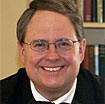Commentary on Mark 1:9-15
This Sunday’s lection comprises three episodes: Jesus’ baptism (Mark 1:9-11), his temptation (1:12-13), and his inaugural preaching (1:14-15).
The preacher could justifiably dedicate a sermon to any of these. I suggest an alternative: so tightly has Mark stitched these episodes together that one could also preach a straight-line sermon that entwines all three. Mark offers us the organizing point (1:15a): “the kingdom of God has come near.”
As the preacher knows but congregants need reminding, “the kingdom of God” is the announcement in the Synoptics around which the rest of Jesus’ words and deeds revolve. In Mark “God’s kingdom” is mentioned fourteen times: its coming (1:15; 9:1; 14:25; 12:34; 15:43), its peculiarities (4:11, 26, 30), to whom it belongs (10:14-15), and impediments to its entry (9:47; 10:23-25). God’s kingdom — better, “kingship,” “reign,” “sovereignty” — is not a place but a power. It is God’s dynamic potency to put right all that is wrong in this world.
In all the Gospels this eschatological dominion, invading time and space, is active in Jesus himself. God has ruled (Psalms 93:1; 97:1; 99:1). In Jesus that rule is mysteriously irrupting (Matthew 10:7 = Luke 10:9; Matthew 12:28 = Luke 11:20). The resurrection, the dawn of a new age, warrants that God will rule (Luke 1:33; Acts 1:3; 1 Corinthians 15:24, 50; Revelation 11:15). In Mark 1:15 that kingdom “is at hand” (Revised Standard Version), “is upon you” (New English Bible), or “has come near” (New Revised Standard Version).
Mark 1:9-14 offers us clues to this kingdom’s character.
- At Jesus’ baptism the kingdom’s end-time features are front and center. Emerging from the Jordan, Jesus “saw the heavens torn apart” (Mark 1:10). That is a classic apocalyptic image, signifying divine disclosure (15:38; see also Isaiah 64:1; Ezekiel 1:1; Acts 7:56; Revelation 4:1). The Spirit’s descent upon (literally, “into” [eis]) Jesus recalls the prophets’ promise that Israel would be reinfused by the Spirit in the last days (Isaiah 11:1-2; Joel 2:28-43; Acts 2:17-22). Jesus alone (Mark 1:11; see also Matthew 3:17) hears the heavenly voice addressing him, “You are my Son, the Beloved; with you I am well pleased”: a scriptural embrace interweaving Psalm 2:7, Genesis 22:1, and Isaiah 42:1.
- Flashes of God’s kingdom illuminate Jesus’ temptation, which Mark narrates more crisply (1:12-13) than either Matthew (4:1-11) or Luke (4:1-13). Unlike the other Gospels, in Mark the Spirit “immediately drove” (literally, “threw [Jesus] out” [ekballei]) into the wilderness for forty days of temptation (see also Exodus 24:28; 1 Kings 19:8). The desert is a place of arduous testing (1 Samuel 22:4; 23:9; 24:1, 22) and divine deliverance (Exodus 19–24; Hos 2:14-15). In Jewish apocalypticism by the time of Mark’s composition, Satan personifies evil as the demons’ ringleader. Mark will refer to Satan’s continuing battle against the heavenly kingdom Jesus advances (3:23-27; 4:14-15; 8:32-33); Jesus himself will attack Satan’s minions, the unclean spirits (1:21-28, 32-34, 39; 3:11; 7:24-30; 9:14-29). Angelic ministration during Jesus’ trial harmonizes with 1 Kings 19:5, 7, and Psalm 91:11-13. “The wild beasts” could be threats but might themselves be threatened: “The devil will flee from you; wild animals will be afraid of you; and the angels will stand by you” (Testament of Naphtali, written around 100 C.). The main point: under the Spirit’s aegis Jesus stands at the center of God’s in-breaking kingdom as both beneficiary (at his baptism) and wrestler (at his temptation).
- “Now after John was arrested” (Mark 1:14a) is no throwaway clause. It casts a long shadow over John’s superior successor, Jesus (1:4-8), who will also be “betrayed” (3:19; 9:31; 14:10-11, 18, 21, 41, 42), “arrested” (14:44), and “handed over” (10:33; 15:1, 10, 15). All of these English words translate the same Greek verb (paradidomi) referring to the baptizer in 1:14a. Like John, Jesus, too, will die by the hand of a weak overlord who is outwitted by others’ schemes (6:14-29; 15:1-15). The kingdom proclaimed by Jesus clashes against mortal principalities and powers that do not gracefully yield to God’s governance (Ephesians 6:12).
If we pay close attention to it, Mark 1:9-15 has the potential to redraw the contours of the liturgical period that begins this Sunday. The time before Easter has long been associated with penitent self-abnegation. That befits Jesus’ preparation for his own sacrifice, to be detailed in coming Sundays. Along the way, however, the church has sometimes extended Passion Week into six weeks of mourning and has confused surrender with easy self-deprivation (“giving up chocolate for Lent”).
Mark points us in a different direction. “The time is fulfilled” (1:15a). This time is not chronos, measured by calendar or clock. It is kairos — a time of critical decision: not every day, but D-Day (Ezekiel 7:12; Dan 7:22; Gal 4:4; Ephesians 1:10; Revelation 1:3b). This kairos is filled to fullness: the cup has been topped up, its contents brimming to overflow. Lent is to Easter as Advent is to Christmas: God has set the kingdom into motion, which will soon go into turbo-drive. As with Advent, so also with Lent: the suitable response is to “repent, and believe in the good news” (Mark 1:15b).
“Repentance” is not feeling miserable over our sins or regretting that we haven’t been more religious. To repent (metanoein) is to turn our minds God-ward: a 180-degree swing-around from kingdoms of our own fabrication toward God’s rectifying power (Mark 8:33). “Belief” in Mark is not creedal or even particularly cognitive: pistis is trust, lying less in the head and more in the gut (2:5; 5:34, 36; 9:24; 10:52; 11:22-24). After unfurling our sails to catch the Spirit’s current, we rely on God’s ability to carry us beyond the squalls (4:35-41; 6:45-52; 13:9-13, 22-27). And God is able — to forgive our sins (2:1-12), to retrieve us from waywardness (2:15-17), to cast out diabolical powers we cannot control (5:1-20), to restore us from years of wretchedness (5:24b-34), to hold onto us tightly when we turn tail and run away (14:27-28; 16:1-8). As Jesus demonstrates, God’s power is propelled by mercy. That is good news: the best anyone could hope to hear. Lent is the season to ponder that.


February 18, 2018